
Will he, won’t he?
Will he stay or will he go? It seems we must await Jackie Weaver’s verdict to find out. Sorry, I muddled up my women-of-the-moment-whose-name-must-be-injected-into-every-sentence. Easy mistake to make: in both cases, it’s all a question of authority.
Jackie Weaver did, it turns out, have the authority to expel the chairman from that parish council meeting. Sue Gray does not have the authority to push the Prime Minister out. (Or even to demand documents or compel people to speak to her.)
Still, the country waits on her pronouncement.
Even with defections, public denouncements by former ministers and a flurry of letters to Graham Brady, we won’t know if Boris Johnson’s malaise is terminal until Ms Gray has delivered her prognosis. Which means all we can do for now is speculate.
With Boris Johnson’s talent for survival, it is understandable that editors, leader writers and columnists are unwilling themselves to make a firm prediction beyond “It’s now a case of ‘when’, not ‘if’”.
Which is absolutely true. He won’t still be prime minister in 2052. He has to go sometime.
So they ask helpful questions like “Is the party over for Boris?” and leave it to MPs, activists and unnamed sources to opine on that – and on whether the Prime Minister’s goose is cooked, if he’s run out of road, is living on borrowed time or drinking in the last chance saloon.
That isn’t surprising, but the initial reluctance to address the question not of “would he go?” but of “should he go?” was disappointing. Ten days ago, that seemed to be a no-brainer for the vast majority of the population, and certainly for left-of-centre media.
The reluctance to address the question not of “would he go?” but of “should he go?” was disappointing.
Telegraph criticises Johnson
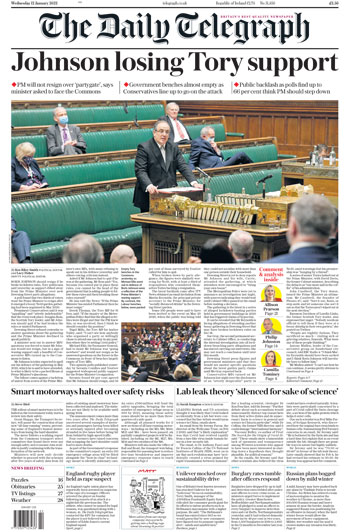
Even the Telegraph was playing hardball with its favourite son – to the point of breaking the story, alongside the Mirror, about the leaving bashes on the eve of Prince Philip’s funeral.
On the day the BYOB party story broke, its front-page report had the unequivocal headline “Johnson received invite to lockdown party” and the pull quote “People who see the evidence now…will think that Boris Johnson’s lies are catching up with him” – as though the lies were a given.
Then it ran a splash – illustrated by the paymaster general at the Despatch Box in front of almost empty Conservative benches – and two spreads on “Johnson losing Tory support”. The paper hardly ever devotes that much space to a single subject, let alone one that would make such uncomfortable reading for the party and leader it champions.
The Mail wasn’t giving up on Johnson so easily. First, it gave him an almighty rocket, declared that Britain was “fizzing with anger”, called up Stephen Glover and Sarah Vine to read the riot act, and pronounced that only a grovelling apology might allow him to move on. Back then it didn’t seem sure which way to jump, but it has grown more confident as the days have gone by. So that while today’s Times and Telegraph leading articles still shirk that “should he go?” question, the Mail uses the top of its front page to tell “a narcissistic rabble” of Tory MPs to “grow up” and get behind the Prime Minister. It’s been an interesting journey.
Most regarded last Wednesday’s PMQs as a victory for Keir Starmer, finally scoring an open goal. One report had it that more people believed the moon landings were faked or that there was a monster in Loch Ness than believed that the prime minister hadn’t realised that he was at a party. Tory opinion poll ratings took a nosedive, the Scottish Conservative leader Douglas Ross said that Johnson should resign and MPs started writing no-confidence letters to the chairman of the 1922 Committee.
Saving Boris

But for the Mail, this was the start of “Operation Save Boris”. If there was a villain that day it was Rishi Sunak for being absent from the Commons on Wednesday and too slow to tweet his support afterwards. Last Thursday’s leader, headlined “PM can bounce back from this humbling”, was extraordinary in the context of the surrounding press coverage. It accepted Johnson’s remorse as sincere and then not only congratulated him for previous “masterstrokes”, but also said that he could come to be regarded as a hero. Not for having parties during lockdown, of course, but for releasing the country from the coronavirus straightjacket – if he were brave enough to do so.
Next day it was urging Tories “to stop the infighting”, the next it was calling for “a sense of perspective”, while accusing Starmer of hypocrisy for holding a bottle of beer in Durham. Was it really in the interests of the country or the party for Johnson to go? By Monday it had well and truly “moved on” and it was the “sanctimonious” Starmer who MUST say sorry.
You have to admire the chutzpah.
Last Thursday’s leader, headlined “PM can bounce back from this humbling”, was extraordinary.
Mirror & Sun: very different approaches
More admirable, though, has been the journalism of the Mirror’s Pippa Crerar, whose previous encounters with the Johnson administration have included being kicked off his election campaign bus and sparking a lobby journalists walkout when Spads tried to exclude her from a David Frost Brexit briefing. She should be savouring her revenge, served nice and cold from a Downing Street wine fridge.
Day after day, she and her paper have been knocking it out of the park. And at the same time, the Mirror has still had room for the “fun” bits of tabloid journalism, the promotions, the celebs, the Andrew saga, beautiful Kate. It’s all been there to complete the package.
Day after day, she and her paper have been knocking it out of the park.
And after the Lord Mayor’s Show…

Meanwhile, an email from an old friend landed in the inbox asking: “What’s going on at the Sun? Today it describes Partygate as ‘a jaw-dropping scandal’ – but not sufficiently jaw-dropping to warrant even a mention on Tuesday’s front page… why ignore one of the best stories in months? It can’t be because of those execs filmed at a drunken lockdown party can it?”
Was my friend Mrs Merton risen from the grave?
Maybe it was the Slack Factor. James Slack (author of the “Enemies of the People” splash when Mail political editor) had been Boris Johnson’s director of communications at the time of that May 2020 party and was now the Sun’s deputy editor.
Under a different editor, that could have been a stonking exclusive to mitigate the embarrassment: the inside lowdown on those lockdown parties. But no. Let’s pretend it never happened.
Then, lo and behold, the Mirror and Telegraph drop the bombshell of the partying on the night before Philip’s funeral – and the fact that it was Slack’s leaving do.
This time, The Sun hid its shame behind that of the Duke of York in losing his royal patronages and his HRH. Partygate was relegated to the 10-11 spread and angled on “Plan Boris” and how the prime minister would cut covid restrictions and sack staff to save his skin.
Downing Street felt the need to apologise to the Queen but, even as it splashed on that the next day, The Sun still couldn’t bring itself to admit in that lead story that “spin-doctor James Slack” was now one of its executives. That nugget had to wait to the penultimate paragraph of the main story on the 4-5 spread, headlined “Covid rules boss broke Covid rules”. Slack himself made a public apology for the “anger and hurt” his farewell drinks had caused. But the Sun didn’t tell readers that.
After that, the paper switched Dukes to put Harry and Meghan back in the line of fire, then told us about Andrew’s teddy bears, while the Mirror carried on doing journalism.
I think these two sets of front pages say it all.
Slack himself made a public apology for the “anger and hurt” his farewell drinks had caused. But the Sun didn’t tell readers that.
(Less than) full disclosure
Talking of burying inconvenient facts, the Mail has also been a little selective about what it shares with its readers.
First, on Monday, there was its report of Downing Street’s denial that the prime minister had been advised to cancel the May 20 garden party. “A report in the Sunday Times claimed he was warned by at least two people… but he dismissed their concerns, praising his private secretary as ‘my loyal labrador’.” This, No 10, said was untrue.
And who was the author of that Sunday Times piece? None other than Mail columnist Dominic Lawson, who appeared a few pages further on saying that “humbled Boris” must be taking comfort from the humiliation of “Brexit wreckers” Gina Miller and John Bercow. Funnily enough, the Mail’s news story didn’t see fit to mention that Lawson was the source of the contested indictment (later apparently corroborated by Dominic Cummings).
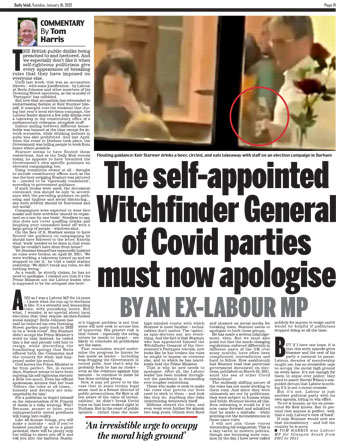
Then, on Tuesday, the paper ran a stinging op-ed headlined “The self-appointed Witchfinder General of Covid parties must now apologise”, with the caps subhead “BY AN EX-LABOUR MP”. This was the latest episode in the “let’s focus on Starmer’s bottle of beer” deflection strategy, courtesy of one Tom Harris (who simultaneously appeared on the Telegraph op-ed saying much the same thing, but with fewer words and linguistic pyrotechnics).
Harris was, it is true, for some years Labour MP for Glasgow South, but he resigned from the party in 2018. He has been a commentator for the Telegraph – not known as a berth for leftwing writers – for the past five years and is now a government adviser and a non-executive director at both the Scottish Office and the office of the Advocate General for Scotland. So he works for the current Conservative government. Once again, the Mail did not feel the need to enlighten readers on that matter.
This definitely falls under the ambit of being “economical with the actualité”.
Once again, the Mail did not feel the need to enlighten readers on that matter.
Operation Red Meat
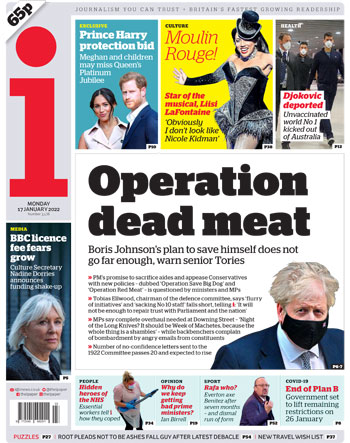
“That is not something we recognise” is a convenient form of words for those who wish to deny something but can’t actually bring themselves to do so outright, for fear of being caught in the lie later. But it was stretching credulity for Nadhim Zahawi to employ it when asked about the slew of policy announcements at the weekend: send the Navy to stop migrants, get cracking on “levelling up”, end all covid restrictions, cut funding to the BBC. Then there were the cultural reforms: sack some staff, ban the booze (will that wine fridge turn up on eBay?). These were reported across the board as being part of Operation Save Big Dog and Operation Red Meat.
It is beyond imagination that newspapers of all political stripes independently dreamt up these names; they were briefed. It is also beyond imagination that all those political editors had the same single source. If Mr Zahawi does not recognise the strategy, it probably means he isn’t in the loop.

As rearguard actions go, the Red Meat strategy worked quite well. At least as far as influencing the press coverage was concerned. Monday’s Times picked up the migrants, the Express went for levelling up, the Mirror for the scapegoating, the Guardian focused on the BBC, and the i on the whole shebang, which it renamed Operation dead meat. The Sun again sought refuge with the royals (Harry this time), while the Mail carried on with its Starmer campaign. Once again, it was the Telegraph that surprised by splashing on Johnson being questioned by Sue Gray.
It came round a bit on Tuesday, leading on Raab’s plans to allow magistrates to impose longer sentences and giving its picture slot to Nadine Dorries, scourge of the BBC and (possibly unwitting) initiator of the “red meat” sobriquet. Dominic Cummings’s latest torpedo made the lead for the Times, Guardian, Mirror, Metro and i, but it was studiously ignored by the Sun (Andrew’s teddy bears), the Express (“Sort out the cost of living”) and Mail, which had British troops going to Ukraine.
Hang on a minute, I thought we were sending weapons, not soldiers. Well, yes, but some people have to go with the weapons – “a small number”, as the minister put it – so that “justifies” the headline.
Don’t get me wrong, what’s going on in Ukraine is terrifying – and is almost certainly far more important in the long term than what’s going on in Westminster. But this wasn’t about the threat to world peace. It was about the threat to the prime minister. It was classic warmongering jingoism, pouncing on a simmering situation that hadn’t been worth a sentence the day before and only 600 words on page 22 the previous Saturday – even with the compelling headline “War only days away”. Even on the day of the splash, it merited only a single inside page and by yesterday, “Putin plotting full-scale invasion” had been pushed back to pages 12 and 13.

Because by then there was the “pork pie plot” (one of the 2019 intake of Tory backbenchers thinking of writing no-confidence letters came from Melton Mowbray) – or the rather more imaginative “porkie pie plot”. Hats off, again, to the Mirror for that one. Headline of a very rich week.
Every paper went on this, some of them very big, whether as bystanders, tacit supporters or disapprovingly. Well, every paper except the FT – where the $75bn Microsoft Call of Duty takeover took precedence – and the Sun. Well naturally. Strictly’s Nadiya has dumped her fiancé. What could be more important than that?
It was classic warmongering jingoism, pouncing on a simmering situation that hadn’t been worth a sentence the day before.
Never had it so good
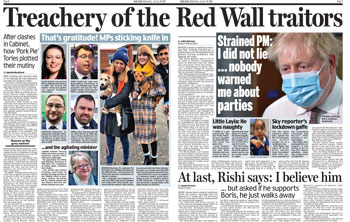
The whitetops were very cross about that pork pie plot. Those Red Wall newbies should realise who they had to thank for their seats. They clearly needed reminding of what their leader had achieved. The Mail said that Britain should be “basking in its post-covid jobs miracle” and was so outraged by the plot that it fell into a rare bout of tautology with the spread headline, “Treachery of the Red Wall traitors”. The leader was meanwhile doing more basking. This time in “three beams of sunny optimism” (covid infections, unemployment and redundancies all down).
Over at the Express - also celebrating a “jobs boom” - the last paragraph of the leader could be taken as a rebuke for the 66% or 74% (depending on which poll you’re reading) of voters who say they don’t believe anything the prime minister has said about the parties: “Unless evidence proves otherwise, this deliverer of life-saving jabs, a jobs-rescuing furlough scheme, Brexit and a historic landslide has earned the right to be taken at his word.”
And just to reinforce the message, the op-ed alongside bore the headline: “World of opportunity for global Britain now we’re free of the EU”.
Cost of living crisis yesterday, record inflation tomorrow. Let’s enjoy the jam today.
The Express has always been ultra-loyal – to whomever seems to be leading the pack. It backed Cameron while the Mail was trying to undermine him - until the Brexit campaign, when it came out full-throatedly for Farage. In the heady post-referendum days, it lined up behind Gove, Johnson and Leadsom in quick succession before going full throttle for May once she took No 10 by default. When she was finished, it was happy to nail its colours to the Johnson mast and there they have been ever since.
This last couple of weeks have taken its devotion to a new level.
The Mail was also ultra-loyal to May to the bitter end. Like the Times, it held its nose and backed Johnson for leader on the basis that he was a “winner”. That it should remain so true to a man who so conspicuously fails to live by its middle-class moralities has been a bit of a surprise. But this last couple of weeks have taken its devotion to a new level (apologies that so much of this Notebook is focused on one title, but there is just so much to look at and wonder at). Is it a case of “Always keep a hold of nurse, for fear of finding something worse”? Yesterday’s leader suggested that it might be, with neither Sunak nor Truss regarded as being suitable replacements – yet. Or is it a question of timing? For now, a weakened PM serves the paper very well because it can chivvy him into serving up the red meat it craves.
Let’s look at a couple of cuts from that carnivorous feast:
First, Covid…

The paper, in line with the Telegraph, has been itching to “get back to normal”. Unlike others, it hasn’t used the “personal liberties” rhetoric and banged on about infringement of people’s rights. It just wants people back at their desks, buying takeaway coffees, building the economy. To further this objective, it has done all it can to play down the health dangers posed by the virus, and particularly the omicron strain (“OFFICIAL: OMICRON 50% LESS SEVERE” – December 23).
That headline might well have been true. It is also true that the infection rate is falling. But people are still in hospital and the death toll (which passed 150,000, almost unremarked by anyone, ten days ago) is still frightening. On the day the Mail published a leader saying Johnson would be a hero if Britain were the first developed country to “exit the pandemic”, 398 people were reported to have died within a month of having covid. The day before it was 379. By the next day, the three-day total had passed 1,000. The rolling weekly toll was 1,724 – up 44% on the previous week. This week, we have seen the daily figure back in the 400s, reaching highs last seen before we had the “world-beating” vaccination programme and boosters.
Fewer people may be dying "of" Covid than "with" Covid. And many may be dying of something completely unrelated a month after a positive test (including a member of my own family). But the official statistics don’t include people killed by Covid who took more than a month to die after their last positive test. And there are far more of those than recovered Covid patients being killed in road accidents, as a Times anti-anti-vax explainer spelt out at the start of the year.
Incidentally, the Times is the only paper still publishing detailed daily stats. Almost everyone else pretends it’s all over. For the Mail, the 398 dead on the day of that Boris-as-hero leader were a subordinate clause on the 7th of its 8 Covid pages (On a story headlined “At last! Isolation set to be cut to five days”).
Yes, infection rates are falling. Yes, we all want to get back to normal. Yes, we must all take responsibility for our own health and well-being. But the picture isn’t entirely rosy. Some of that decline in the infection rate must be down to people who aren’t that ill not bothering to get a PCR test even after a positive lateral flow test. OK, if they’ve only got a sniffle, maybe it doesn’t matter, so long as they isolate and don’t pass it on to people who might become really ill. But we are still seeing an awful lot of excess deaths.
Much as the Mail might wish it, we can’t “exit” the pandemic with the insouciance of someone leaving a WhatsApp group. Restrictions are coming off to the point that even those with the virus may no longer have to stay at home; testing is bound to be wound down. I think even those papers celebrating this “liberation” should have the honesty to report those deaths as prominently as their “good news”.
This week, we have seen the daily figure back in the 400s, reaching highs last seen before we had the “world-beating” vaccination programme and boosters.
Next, the BBC…
The Mail, Telegraph and Murdoch press have never had much love for the BBC. So Nadine Dorries’s tweet, followed by her announcement on the licence free freeze was tantamount to declaring open season.
Yesterday, the Mail reported warnings that BBC2 might be closed as a result of the funding cuts (which, of course, it won’t) and ran a leader headlined “Bleating BBC” telling it to pull in its belt like everyone else has to. The day before, there was a spread on the formal announcement, which was framed as “a £23bn boost”, and an op-ed telling BBC bosses to stop wailing and embrace the death of the licence fee. The day before that, there had been another spread with Stephen Glover urging Nadine to keep her nerve.
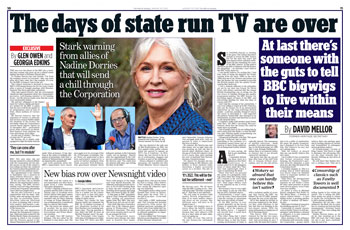
The Sunday paper had splashed on “Nadine clobbers ‘biased’ BBC with £2bn funding cut” (not quite a £23bn boost). The text, and the headline on the inside spread, declared this was the “end of state-run television”. And there I was, thinking that the complaint was that the corporation didn’t put the government’s point of view across fairly, wouldn’t a state-run TV network make sure that it did?
But even before Dorries made her move, the daily had been in full cry. On Friday, it had “Tories hit out at ‘outrageous bias’ in BBC’s coverage of apology by PM” with a sidebar suggesting the row could bring a cost in the licence fee negotiations, and an op-ed opposite by Mick Hume saying “Whatever you think of Boris, the BBC’s obsessive campaign to destroy him is a disgrace”. The baddie here was Nick Robinson for asserting in an interview that “most people thought the PM was only saying sorry because he’d been caught”. Which, as repeated polls had shown, was exactly what most people did think.
[The BBC was further taken to task by Charles Moore who used his Telegraph column on Tuesday to accuse it of behaving like a “Fox News of the left” in its handling of the Partygate stories. Robinson wrote to defend the corporation and, to its credit, instead of burying the riposte on its letters page, the paper made it a “Presenter hits back…” news story on page 6.]
But back to the Mail. That Mick Hume piece referred back to an essay by Stephen Glover earlier this month entitled “A week in the life of Today that has made me despair of BBC bias”, an article that raised some valid issues.
But, as with everything, you have to look at who is saying something to determine how much weight to put on the argument. Glover was hardly covering new territory then – or in the piece this week urging Dorries to keep her nerve.
In 2020, I conducted some detailed research into the Mail’s coverage of the BBC for a book by Peter York and Patrick Barwise. I was looking only at the last ten years of Paul Dacre’s tenure and in that time, Glover wrote about a hundred pieces mentioning the corporation, 73 of them critical. Since then, he has taken dozens more swipes at it, sometimes as the central target and sometimes as collateral damage as part of a completely different argument – for failing, for example, to cover a particular story or for giving too much prominence to another.
I guess you could do a similar exercise with my output about the Daily Mail. We all have our pet subjects. And the BBC is certainly one of the Mail’s.
Which, to go back to where we started, is one of the reasons it is championing Johnson in his time of trouble. It wants the BBC curtailed. It wants migrant boats stopped. It wants Covid restrictions lifted. It has secured at least two of those this week. Watch this space for the next assault on green energy levies. Like the blackmailer, it is going to keep coming back for more.
We all have our pet subjects. And the BBC is certainly one of the Mail’s.
Sidney Poitier

Too much Boris. Too much Mail. I’m sorry. There’s no room for Andrew or Meghan or Kate (who did, as promised here last time, look fabulous at 40 in a special Mail on Sunday magazine – even if it wasn’t “superb”). Or for Tony and Cherie Blair’s furlough claims – even though I trawled through an Excel spreadsheet of 940,000 payments. Or for the Sun’s £50m man and his “welcome home” blast at the prime minister.
But I would like to mention Sidney Poitier. His death a couple of weeks ago saddened me, and Lulu singing “To Sir with Love” has been my earworm ever since.
The following day’s Guardian was exactly as I expected. A huge portrait on the front, a spread on the news pages with a narrative by Peter Bradshaw, an appreciation by David Harewood and tributes from the great and good, including Barak Obama. The limited Saturday obituary space had already been claimed by Peter Bogdanovich, so the formal obit had to wait until Monday – another full spread.
This was a renowned actor who had not only been loved for his screen performances, but had also changed perceptions; a man of quiet dignity almost universally admired. But he was also 94. Is “old man dies” front-page news. Especially if he hadn’t impinged on the lives of most people under 40?
This is the only explanation I can think of for his absence from the front page of the Times. The splash that day was based on an interview with the new chief of the defence staff. Fair enough. But did they have to illustrate it with a full-drop double column photograph of a 56-year-old white man? Couldn’t they have limited the admiral to a drop-in. There was, after all, a big picture of him on the spread where the interview ran in full.
Coverage was scant on the inside news pages, too. Yes, he was the lead obit way back in the book. But the first mention of his death came as an extended picture caption in a tint panel on page 5. It wasn’t even the page lead. That honour went to a landlord awarded millions after being jailed for a food safety vendetta – one of two stories in that day’s paper that had been published in Private Eye four days previously (neither was credited).
Was it a generational thing? The editor is of an age to have grown up on Poitier films, but maybe the paper was put together by lieutenants too young to appreciate that this was more than just any old Hollywood star. Even if that were the case, the Obama tribute should have given the clue to his importance.
The Telegraph also declined to make a big thing of him on the front – preferring Louise Minchin talking about a stalker sending death threats as the big picture – but he was there with his Oscar in the News in Brief.
The Express, bless it, was the only paper other than the Guardian to make Poitier its main image. The Mirror and Star put little headshots at the top of page one, but he was absent from the Mail, i and Sun fronts – all of which had plenty of Saturday puff space. The i did at least give him all of page 7, while the Sun pushed him back to 22 and the Mail to page 26.
It just felt wrong to me. Maybe I’m getting too old.
Were the people putting the paper together simply too young to realise who Poitier was? Shouldn’t the Obama tribute have given the clue to his importance?
Front page of the fortnight

There have been so many good ones from the Mirror that it has to be crowned the winner, but I’d like to commend this effort from the Daily Express. It always helps a page to strip down the peripherals. Here is the evidence that less is more.
Liz Gerard’s Notebook is a fortnightly column published in the InPubWeekly newsletter. To be added to the mailing list, enter your email address here.












